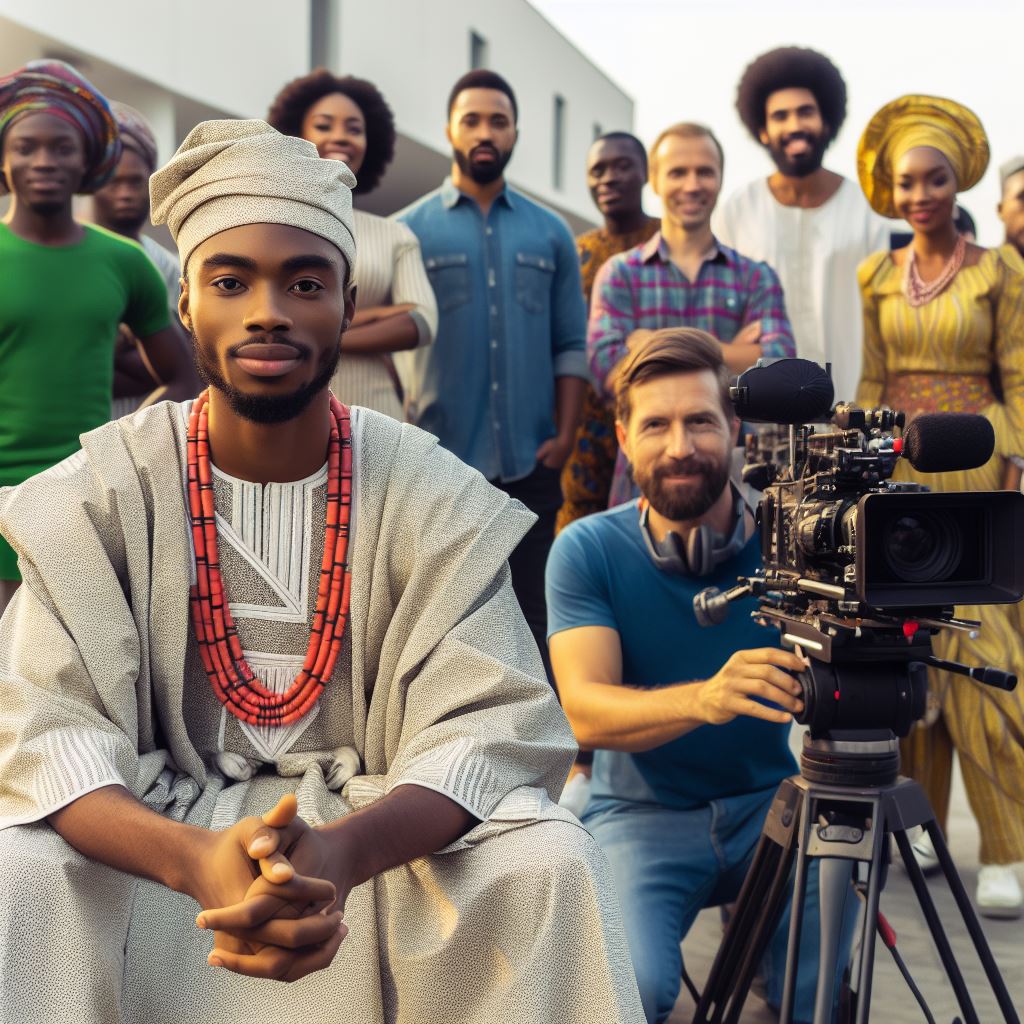Introduction
The Nigerian film industry, also known as Nollywood, is a booming sector. It is globally recognized for its vibrant storytelling and prolific output. Aspiring filmmakers must possess a range of essential skills to thrive in this competitive environment.
Brief Overview of the Nigerian Film Industry
Nollywood is the second-largest film industry in the world by volume. It produces thousands of films annually, showcasing diverse stories and cultures. The industry’s rapid growth has increased its influence and economic impact.
Nollywood’s origins trace back to the early 1990s. It evolved from a small-scale video production business to a global powerhouse.
Today, Nollywood films are celebrated for their originality and cultural relevance. They resonate with audiences across Africa and the diaspora.
The industry offers vast opportunities for creative talents. However, it also demands high levels of professionalism and dedication. Success in Nollywood requires more than passion; it necessitates a strong skill set.
Importance of Having Essential Skills for Success in Film Production
Storytelling and Scriptwriting
Mastering storytelling is crucial. A compelling script is the foundation of any successful film. Aspiring filmmakers must learn how to craft engaging narratives that captivate audiences.
They should develop skills in plot development, character creation, and dialogue writing.
Directing and Vision
A director’s vision shapes the entire film. Strong directing skills ensure that the story is told effectively.
Directors must understand how to guide actors, manage crews, and oversee the technical aspects of filming. They need a clear vision and the ability to communicate it effectively.
Cinematography
Cinematography is the art of visual storytelling. Good cinematographers know how to use camera angles, lighting, and movement to enhance a film’s mood and message. They should be proficient with modern filming equipment and techniques.
Editing and Post-Production
Editing brings the film together. Skilled editors can transform raw footage into a coherent and compelling story. They must be adept with editing software and understand the nuances of pacing, transitions, and visual effects.
Production Management
Effective production management ensures smooth filming processes. Producers must handle budgeting, scheduling, and logistics. They need strong organizational skills to coordinate various aspects of production and keep everything on track.
Marketing and Distribution
Understanding marketing and distribution is essential for a film’s success. Filmmakers must know how to promote their films and reach their target audiences.
Skills in social media marketing, publicity, and networking can significantly enhance a film’s visibility and profitability.
In review, success in Nigerian film production demands a comprehensive skill set. Aspiring filmmakers must master storytelling, directing, cinematography, editing, and production management.
They also need to understand marketing and distribution. These essential skills are the building blocks of a thriving career in Nollywood.
By developing these abilities, filmmakers can contribute to the industry’s continued growth and global impact.
Understanding Nigerian Film Industry
Overview of Nollywood and Its Impact on the Global Film Industry
Nollywood, Nigeria’s vibrant film industry, ranks among the largest in the world. It produces thousands of films annually, captivating audiences globally.
The industry emerged in the early 1990s, rapidly growing in scale and influence. Nollywood’s unique storytelling resonates with diverse audiences, making it a cultural powerhouse.
Nollywood films often blend drama, comedy, and traditional African elements, creating a distinct cinematic style. These films address social issues, folklore, and contemporary life in Nigeria.
The relatable content and innovative storytelling have garnered a massive following. Nollywood’s success has inspired filmmakers worldwide, showcasing the potential of African cinema.
The industry’s impact extends beyond entertainment, significantly contributing to Nigeria’s economy. Nollywood generates employment for countless actors, directors, and technical staff.
It also stimulates growth in related sectors like tourism and fashion. This economic contribution highlights Nollywood’s importance beyond artistic value.
Nollywood’s global reach has also fostered international collaborations. Filmmakers from various countries seek partnerships with Nollywood studios.
These collaborations enhance the quality of productions and promote cultural exchange. As a result, Nollywood continues to gain recognition at prestigious film festivals worldwide.
Importance of Knowing the History and Trends in Nigerian Film Production
Understanding Nollywood’s history is crucial for anyone entering the Nigerian film industry. The industry’s origins trace back to traditional theater and early colonial cinema.
Early Nigerian filmmakers faced numerous challenges, including limited funding and resources. Despite these obstacles, they produced compelling stories that laid the foundation for Nollywood’s success.
Knowing this history helps filmmakers appreciate the industry’s resilience and creativity. It also provides insights into the evolution of Nigerian storytelling techniques.
Familiarity with past trends allows filmmakers to innovate while respecting traditional narratives. This balance between old and new enriches Nollywood’s storytelling.
Keeping up with current trends is equally important. The Nigerian film industry is dynamic, constantly evolving to meet audience demands. Recent trends include the use of high-definition technology and digital distribution platforms.
These advancements have improved film quality and expanded Nollywood’s audience reach.
Another trend is the exploration of diverse genres. While Nollywood is known for its drama and comedy, filmmakers are experimenting with horror, science fiction, and historical dramas.
This diversification attracts a broader audience and showcases the versatility of Nigerian filmmakers.
Understanding trends also involves recognizing the impact of social media and streaming services. Platforms like Netflix and YouTube have transformed film distribution, offering global visibility to Nollywood films.
Filmmakers must leverage these platforms to reach wider audiences and maximize their impact.
In summary, a thorough understanding of Nollywood’s history and trends is essential for success in the Nigerian film industry.
This knowledge equips filmmakers with the tools to innovate, respect tradition, and navigate the ever-changing landscape of Nollywood.
Embracing this blend of history and modernity will ensure the continued growth and global influence of Nigerian cinema.
Read: Communication Arts: Balancing Theory and Practice
Technical Skills in Film Production
In the world of Nigerian film production, having strong technical skills is essential for success.
From capturing the perfect shot to creating seamless transitions, understanding the intricacies of camera operations, lighting, and sound equipment is crucial.
Here, we will delve into the importance of technical skills in film production and how mastering editing software and special effects techniques can elevate the quality of Nigerian films.
Knowledge of Camera Operations, Lighting, and Sound Equipment
A solid foundation in camera operations is fundamental for any aspiring filmmaker. Knowing how to adjust settings, frame shots, and work with different types of cameras can make a huge difference in the final product.
Lighting is another critical aspect of film production, as it sets the mood and enhances the overall aesthetic of a scene. Understanding how to manipulate natural and artificial light sources can help create visually stunning images.
Additionally, having a good grasp of sound equipment is essential for capturing clear and crisp audio.
Knowing how to position microphones, adjust levels, and eliminate background noise can greatly improve the overall sound quality of a film.
Importance of Mastering Editing Software and Special Effects Techniques
In today’s digital age, editing software plays a vital role in the post-production process.
Being proficient in software such as Adobe Premiere Pro, Final Cut Pro, or Avid Media Composer allows filmmakers to edit footage, add visual effects, and enhance the audio quality of their films.
Mastering these tools can help streamline the editing process and bring a filmmaker’s vision to life. Special effects techniques, such as green screen compositing, CGI, and motion graphics, can add an extra layer of creativity and excitement to a film.
By learning how to seamlessly integrate these effects into their projects, filmmakers can create visually captivating scenes that engage and entertain audiences.
Overall, technical skills are essential for success in Nigerian film production. From camera operations to editing software, having a strong foundation in these areas can help filmmakers bring their creative vision to life.
By continuously honing their skills and staying up-to-date with the latest technology and techniques, Nigerian filmmakers can produce high-quality films that captivate audiences and leave a lasting impact on the industry.
Read: How to Apply for Communication Arts Programs
Essential Skills for Success in Nigerian Film Production: Creative Storytelling Skills
Developing Engaging and Culturally Relevant Storylines
Creating a compelling storyline is crucial for film production success. Filmmakers need to master the art of storytelling. They must craft narratives that captivate audiences from start to finish. Engaging storylines keep viewers emotionally invested in the film.
A well-developed storyline requires a strong plot and relatable characters. Characters must face challenges and undergo transformation.
Their journeys should resonate with the audience. Filmmakers must ensure the plot progresses logically and maintains suspense.
Dialogue plays a significant role in developing storylines. Natural and authentic dialogue enhances character development. It also helps to drive the plot forward.
Filmmakers should focus on creating believable interactions between characters. These interactions should reflect real-life conversations.
Moreover, pacing is essential in storytelling. A well-paced film maintains audience interest.
It avoids dragging scenes or rushed plot points. Filmmakers must balance action, dialogue, and narrative progression. This balance ensures a smooth and engaging storyline.
Incorporating Nigerian Culture and Values
Incorporating Nigerian culture into film narratives enriches the storytelling. Nigerian culture is diverse and vibrant. It offers a wealth of material for filmmakers to explore.
By embedding cultural elements, filmmakers create authenticity and depth in their stories.
Nigerian films should reflect the country’s unique traditions and values. This reflection helps to preserve and promote cultural heritage. Filmmakers can draw from folklore, music, dance, and traditional customs.
These elements make the storyline more relatable to Nigerian audiences.
Cultural references also enhance the film’s appeal to international viewers. They provide a window into Nigerian life and traditions. Filmmakers should aim to showcase Nigeria’s rich cultural tapestry.
This showcase can foster greater understanding and appreciation of Nigerian culture globally.
Values such as family, community, and resilience are central to Nigerian life. These values should be woven into film narratives. They can be portrayed through character interactions and plot developments.
By highlighting these values, filmmakers create stories that resonate deeply with viewers.
The Importance of Authentic Representation
Authentic representation in film is vital. It ensures that Nigerian stories are told accurately and respectfully. Filmmakers must strive for authenticity in their portrayals. This effort involves research and collaboration with cultural experts.
Accurate representation builds trust with the audience. It shows respect for the culture and its people. Filmmakers should avoid stereotypes and clichés. Instead, they should focus on genuine and nuanced portrayals of Nigerian life.
Authenticity also involves language use. Incorporating local dialects and expressions adds realism to the film.
It helps the audience connect with the characters and the story. Filmmakers should be mindful of language nuances and cultural contexts.
Basically, Creative storytelling is essential for success in Nigerian film production. Developing engaging and culturally relevant storylines captivates audiences.
Incorporating Nigerian culture and values enriches narratives and fosters authenticity. Filmmakers must focus on crafting compelling plots, authentic characters, and meaningful cultural representations.
By doing so, they contribute to the preservation and promotion of Nigerian culture through cinema.
Read: Famous Nigerian Alumni of Communication Arts Programs
Transform Your Career with Expert Guidance
Get personalized mentorship consulting that’s tailored to your unique path. Our expert advice is actionable and exclusive.
Get Started
Collaboration and Teamwork in Nigerian Film Production
Working Effectively with Actors
Success in Nigerian film production hinges on effective collaboration with actors. Directors must foster a supportive environment. This helps actors perform at their best. Providing clear direction and feedback ensures actors understand their roles.
Directors should also be open to actors’ interpretations. Flexibility allows for authentic performances. Establishing trust with actors is crucial. Trust encourages creativity and experimentation, which enriches the film.
Regular rehearsals are essential. They help actors and directors align their visions. This collaboration translates to compelling on-screen chemistry.
Collaborating with Crew Members
A film’s success depends on a cohesive crew. Each crew member plays a vital role. Directors should communicate expectations clearly. This minimizes misunderstandings and errors.
Encouraging open dialogue is crucial. Crew members should feel comfortable voicing concerns and suggestions. Respecting each crew member’s expertise enhances teamwork.
Delegating responsibilities effectively ensures efficiency. Regular meetings keep everyone on the same page. They help address issues promptly and keep the project on track.
Acknowledging crew members’ hard work boosts morale. Positive reinforcement fosters a motivated team.
Engaging the Production Team
The production team is the backbone of a film project. Their coordination ensures smooth operations. Effective communication is key to this coordination. Directors must articulate their vision clearly.
This helps the production team execute plans accurately. Leadership skills are essential for directors. They must inspire and guide the production team.
Decision-making should be swift and informed. This keeps the project moving forward. Building a strong rapport with the production team is beneficial. It creates a positive working environment.
A united production team can overcome challenges efficiently.
Importance of Communication Skills
Clear communication is paramount in film production. It prevents misunderstandings and streamlines processes. Directors should articulate their ideas concisely.
This ensures everyone understands the project’s vision. Active listening is equally important. It helps directors understand team members’ perspectives.
Providing constructive feedback improves performance. Feedback should be specific and actionable. Encouraging open communication fosters a collaborative atmosphere.
Team members should feel their voices are heard. Regular updates keep everyone informed. They help track progress and address issues promptly.
Leadership Skills in Film Projects
Strong leadership drives successful film projects. Directors should lead by example. They set the tone for the team’s work ethic. A positive attitude from the director motivates the team.
Directors should also be decisive. Quick decision-making keeps the project on schedule. Problem-solving skills are vital. Directors must address issues promptly and effectively.
Inspiring confidence in the team is crucial. It boosts morale and productivity. Delegating tasks efficiently is a key leadership skill. It ensures each team member can focus on their strengths.
Continuous learning and adaptation improve leadership. Directors should seek feedback and grow from it.
In essence, Collaboration and teamwork are essential in Nigerian film production. Directors must work effectively with actors, crew, and the production team.
Communication and leadership skills are crucial for success. These skills ensure a cohesive, motivated team and a smooth production process. By fostering collaboration, directors can bring their creative visions to life.
Read: Digital Media Trends in Communication Arts
Budgeting and Financial Management in Nigerian Film Production
In the Nigerian film industry, effective budgeting and financial management are crucial. Understanding the cost of film production and distribution, and securing funding are essential skills for success.
Understanding the Cost of Film Production and Distribution
First, filmmakers must comprehend all costs associated with production. These costs include pre-production, production, and post-production expenses. Pre-production involves scriptwriting, location scouting, and casting.
During production, costs cover equipment rentals, crew salaries, and catering. Post-production includes editing, visual effects, and sound design.
Distribution costs also play a significant role. These include marketing, festival submissions, and distribution fees. Filmmakers must allocate funds for promoting the film to reach a wider audience.
Without understanding these costs, budgeting becomes ineffective.
Importance of Budgeting
Budgeting is the backbone of any film project. It helps filmmakers allocate resources efficiently.
A well-structured budget ensures that all aspects of production receive adequate funding. It prevents overspending and helps manage financial risks.
A detailed budget also attracts investors. Investors want to see a clear financial plan before committing funds. It demonstrates professionalism and increases confidence in the project’s success.
Securing Funding for Film Projects
Securing funding is often the most challenging aspect. Filmmakers must explore various funding sources.
These include personal savings, loans, grants, and investments. Each source has its pros and cons, which filmmakers must evaluate carefully.
Personal savings provide control but can be limiting. Loans need repayment with interest, adding financial pressure. Grants offer non-repayable funds but are highly competitive.
Investments from private investors or production companies can be substantial but may involve sharing creative control.
Crafting a Compelling Pitch
A compelling pitch is essential for attracting funding. Filmmakers must clearly articulate their vision and financial needs. A well-prepared pitch includes a synopsis, budget breakdown, and business plan.
It should highlight the film’s potential for success and profitability.
Financial Management Throughout Production
Financial management doesn’t stop after securing funding. Filmmakers must monitor expenditures throughout the production process.
Regularly reviewing the budget helps identify and address overspending early. It also ensures that funds are used as planned, preventing financial shortfalls.
In summary, budgeting and financial management are vital skills in Nigerian film production. Understanding costs, creating detailed budgets, and securing funding are essential steps.
A compelling pitch and effective financial management throughout production ensure the project stays on track. These skills not only enhance the quality of the film but also its financial success.
With these skills, Nigerian filmmakers can navigate the industry more effectively and produce high-quality films that reach a global audience.
Marketing and Distribution Strategies in Nigerian Film Production
In the vibrant and rapidly growing Nigerian film industry, marketing and distribution are crucial for success.
Understanding the audience, staying ahead of market trends, and leveraging effective promotional strategies are key elements.
This section explores the essential skills needed for marketing and distributing Nigerian films.
Understanding the Target Audience
Knowing the target audience is the first step in any marketing strategy. Filmmakers must identify who will watch their films. This involves analyzing demographics, interests, and viewing habits.
For instance, a romantic comedy may appeal more to younger audiences, while a historical drama might attract older viewers.
Filmmakers should conduct surveys and focus groups. These tools help gather valuable insights about potential viewers’ preferences. Social media platforms are also useful for engaging with audiences directly.
Through these interactions, filmmakers can tailor their content to meet audience expectations.
Staying Ahead of Market Trends
The Nigerian film industry is dynamic and ever-changing. Filmmakers need to stay updated with current market trends. This includes understanding popular genres, themes, and storytelling techniques.
Regularly watching successful films can provide insights into what resonates with audiences.
Networking within the industry is another way to stay informed. Attending film festivals, workshops, and industry events allows filmmakers to learn about new trends.
Reading industry publications and following influential figures on social media can also provide valuable updates.
Creating Effective Promotional Materials
Promotional materials are vital for attracting attention to a film. Filmmakers must create compelling trailers, posters, and social media content.
These materials should highlight the film’s unique selling points. High-quality visuals and engaging content can significantly boost a film’s visibility.
A strong online presence is essential. Filmmakers should use websites, blogs, and social media to promote their films. Regular updates, behind-the-scenes content, and interactive posts can keep the audience engaged.
Collaborating with influencers and bloggers can also amplify the film’s reach.
Organizing Film Screenings
Film screenings are an excellent way to generate buzz. Organizing premiere events, private screenings, and film festivals can create excitement and anticipation.
These events provide opportunities for direct interaction with the audience. They also offer a platform for media coverage and reviews.
Selecting the right venues for screenings is important. Filmmakers should choose locations that are accessible and appealing to their target audience.
Collaborating with cinemas and cultural centers can enhance the event’s appeal. Offering special experiences, like Q&A sessions with the cast and crew, can also add value.
Leveraging Distribution Channels
Effective distribution is crucial for reaching a wide audience. Filmmakers must explore various distribution channels, both traditional and digital. Partnering with film distributors and streaming platforms can increase a film’s accessibility.
Understanding the contractual and financial aspects of distribution is important. Filmmakers should negotiate favorable terms and ensure their films are marketed effectively by distributors.
Digital platforms, like Netflix and Amazon Prime, offer great potential for reaching international audiences.
In fact, marketing and distribution are essential skills for success in the Nigerian film industry.
Filmmakers must understand their audience, stay updated on market trends, create effective promotional materials, organize engaging film screenings, and leverage various distribution channels.
By mastering these strategies, Nigerian filmmakers can ensure their films reach a wide and appreciative audience.
Adaptability and Problem-Solving Skills in Nigerian Film Production
Adaptability and problem-solving are crucial skills for success in Nigerian film production. Filmmakers must navigate unpredictable challenges, making these abilities essential.
Thinking Quickly and Making Creative Decisions on Set
The film set is a dynamic environment, often requiring quick thinking and decisive action. Directors and producers must adapt to changing circumstances without losing sight of their vision.
For instance, unexpected weather changes might necessitate adjusting outdoor scenes. Filmmakers who can think on their feet will ensure the production stays on track.
Creative decision-making is equally important. Sometimes, the perfect shot isn’t feasible due to unforeseen constraints. In these moments, creativity becomes a powerful tool.
Filmmakers must reimagine scenes and find innovative solutions that maintain the story’s integrity. This adaptability can turn potential setbacks into unique opportunities for artistic expression.
Handling Unforeseen Challenges and Setbacks
Film production is rife with unexpected challenges. Equipment failure, actor unavailability, or location issues can disrupt the schedule. Successful filmmakers anticipate such issues and develop contingency plans.
This proactive approach minimizes downtime and keeps the production moving forward.
Moreover, effective problem-solving involves staying calm under pressure. When setbacks occur, a composed mindset allows for clear thinking and better decision-making.
Filmmakers must assess the situation, identify viable solutions, and implement them swiftly. This ability to handle crises efficiently can distinguish a successful production from a failed one.
Importance of Team Collaboration
Adaptability and problem-solving aren’t solo endeavors. They require strong teamwork and communication. Every crew member plays a role in overcoming challenges.
Open communication ensures everyone is aware of issues and potential solutions. A cohesive team can brainstorm together, leveraging diverse perspectives to find the best path forward.
Producers and directors must foster a collaborative environment. By encouraging input from all team members, they can harness the collective creativity and problem-solving skills of the crew.
This inclusive approach not only resolves issues more effectively but also boosts morale and cohesion.
Learning from Experience
Adaptability and problem-solving skills are honed through experience. Each production offers lessons that filmmakers can apply to future projects.
Reflecting on past challenges and how they were resolved builds a knowledge base for tackling new obstacles.
Filmmakers should continuously seek to improve their adaptability. This involves staying updated with industry trends and new technologies.
Being open to learning and growth ensures they are better prepared for the unexpected.
Embracing a Positive Mindset
A positive mindset is crucial when facing challenges. Filmmakers should view setbacks as opportunities to innovate rather than insurmountable obstacles. This perspective fosters resilience and determination.
Encouraging a positive outlook within the team also helps maintain morale. When everyone remains optimistic, the crew is more likely to stay motivated and focused.
This collective positivity can turn challenging situations into rewarding experiences.
In a nutshell, In Nigerian film production, adaptability and problem-solving skills are vital for success. Quick thinking, creative decision-making, and effective handling of setbacks are essential.
Team collaboration, continuous learning, and a positive mindset further enhance these abilities. Filmmakers who master these skills will navigate challenges smoothly, ensuring their productions reach their full potential.
Networking and Building Industry Connections
In Nigerian film production, networking and building industry connections are critical for success. Here, we explore key strategies to help you thrive.
Attending Film Festivals
Attending film festivals can significantly boost your career. Festivals provide a platform to showcase your work. They attract filmmakers, actors, and industry professionals from around the world.
Networking at these events can open doors to new opportunities. You can meet potential collaborators and investors. It is also an excellent way to learn about industry trends.
Engaging in Workshops
Workshops offer invaluable learning experiences. They provide hands-on training and expert insights. Participating in workshops helps you improve your skills.
You also get to meet like-minded individuals. Building relationships in such environments can lead to future collaborations. Workshops often feature industry leaders, providing a chance to gain mentorship.
Attending Networking Events
Networking events are designed to facilitate connections. They provide a relaxed environment to meet industry peers. You can discuss ideas and share experiences.
These events are perfect for expanding your professional circle. Effective networking can lead to job opportunities and collaborations. Always carry business cards to exchange contact information easily.
Collaborating with Filmmakers
Collaborating with other filmmakers is crucial for success. Joint projects allow you to share resources and expertise. You can learn from each other’s strengths and weaknesses.
Collaboration also helps in creating more polished and diverse projects. It is an excellent way to build a reputation in the industry. Successful collaborations can lead to long-term partnerships.
Working with Industry Professionals
Connecting with industry professionals offers numerous benefits. These individuals have valuable experience and insights. They can provide guidance and mentorship.
Building relationships with professionals can help you navigate the industry. They can also introduce you to influential contacts. This can significantly boost your career prospects.
Leveraging Social Media
Social media platforms are powerful networking tools. They allow you to connect with industry professionals globally. Share your work and engage with others in the industry.
Join film production groups and participate in discussions. Social media can help you stay updated on industry news and events. It is a valuable resource for building a professional online presence.
The Importance of Industry Events
Industry events like film festivals and workshops are not just about learning. They are about building relationships. The connections you make at these events can lead to future projects.
They can provide support and inspiration. Attending these events regularly helps maintain and grow your network.
Building Long-Term Relationships
Building long-term relationships is key to sustaining a successful career. Maintain regular contact with your connections. Follow up after meeting someone new. Show genuine interest in their work.
Long-term relationships are built on trust and mutual respect. These relationships can provide ongoing support and collaboration opportunities.
In review, In Nigerian film production, success is deeply rooted in networking and building industry connections.
By attending film festivals, engaging in workshops, and collaborating with other professionals, you can significantly enhance your career. Remember, the connections you build today will shape your future in the industry.
Conclusion
Recap of Essential Skills for Success in Nigerian Film Production
In Nigerian film production, certain skills are essential for success. These skills form the foundation of a thriving career in the industry. Let’s recap the key skills we’ve discussed.
First, storytelling stands at the core. Mastery of narrative techniques is crucial. Effective storytelling captivates the audience and delivers a powerful message.
Second, technical proficiency is non-negotiable. Filmmakers must understand camera operations, lighting, and sound. These elements ensure high-quality production values.
Third, strong communication skills are vital. Filmmaking is a collaborative effort. Clear communication with cast and crew enhances teamwork and efficiency.
Fourth, creativity and innovation set filmmakers apart. Unique ideas and creative solutions drive the industry forward. Embrace creativity to make your work stand out.
Fifth, problem-solving abilities are indispensable. Filmmaking often involves unexpected challenges. Quick thinking and adaptability can save a project.
Sixth, time management ensures smooth production flow. Meeting deadlines is crucial in this fast-paced industry. Efficient time management keeps projects on track.
Seventh, financial acumen is essential. Understanding budgeting and financial planning helps manage resources effectively. It ensures a project stays within budget.
Eighth, marketing and distribution knowledge cannot be ignored. Knowing how to promote and distribute films ensures they reach a wide audience. This maximizes the film’s impact and profitability.
Lastly, networking skills are crucial. Building connections within the industry opens doors to opportunities. Networking helps in gaining support and resources for projects.
Encouragement for Aspiring Filmmakers
Aspiring filmmakers, your journey to success begins with skill development. Embrace the challenge and dedicate yourself to learning and growth.
Storytelling is your first step. Immerse yourself in different narratives and practice crafting your own. Storytelling prowess is the heart of filmmaking.
Technical skills come next. Invest time in mastering your equipment. Practice shooting, lighting, and sound recording. Technical excellence enhances your storytelling.
Communication skills are vital. Engage in team projects and improve your ability to convey ideas clearly. Good communication fosters a collaborative environment.
Creativity should be nurtured continuously. Experiment with new ideas and techniques. Innovation keeps your work fresh and exciting.
Problem-solving will become second nature. Face challenges head-on and find creative solutions. This resilience will strengthen your projects.
Time management can be learned. Use tools and techniques to organize your schedule. Efficient time use is key to meeting deadlines.
Financial skills are equally important. Learn about budgeting and financial planning. Managing finances ensures your projects are feasible and sustainable.
Marketing and distribution knowledge will amplify your film’s reach. Understand how to market your work and navigate distribution channels. This maximizes your audience.
Networking can open many doors. Attend industry events and connect with peers. Building a strong network supports your career growth.
Success in Nigerian film production is within your reach. Develop these essential skills and continuously seek improvement. Your dedication will lead to a rewarding career in this vibrant industry.
Keep learning, keep creating, and let your passion for filmmaking drive you forward. The Nigerian film industry is rich with opportunity, and with the right skills, you can make a significant impact. Your journey starts now.




